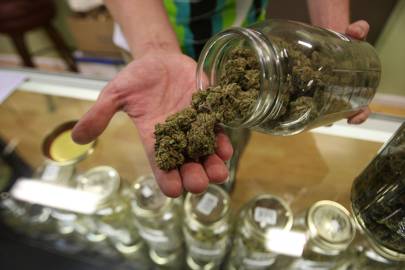
David McNew/Getty Images
Years ago, when Perry Davidson sold weed in the Israeli
desert, he noticed that most of his customers weren’t just in it for the
high. From cancer sufferers to those recovering from operations, most
came seeking refuge from pain - without the addiction of prescription
pills.
Now Davidson is founder and CEO of Syqe, a Tel
Aviv-based startup that has developed “the world’s first selective
dose, pharmaceutical grade medicinal plants inhaler”. In simple terms,
Davidson has created a marijuana inhaler. Doctors can control the Syqe
Inhaler remotely, ensuring patients a regulated, reliable dose of
marijuana.
In addition
to Syqe, Israel is home to firms like vapour capture brand CannRX,
genomics platform Steep Hill and MedAware, software aiming to reduce
incorrect and overprescription of opioids.
To Saul Kaye, an entrepreneur
and founder of industry group iCAN, it’s an obvious extension of
Israel’s tech prowess. “It comes down to local assets,” he says. “We
have a scarcity of water, so we developed water systems. Israel is
mostly desert, so we developed how to grow vegetables in the desert. Now
we become experts in tech transfer.”
Cannabis is one of very few issues to unite
Israel’s political landscape. Orthodox rabbis have sanctioned its use.
The country has effectively decriminalised cannabis use. Freed from red
tape, its entrepreneurs are bringing cannabis innovation to the US.
“This is a society that sees just stigma around marijuana,” says
Davidson of the US. “You need to be able to give people a drug that is
predictable so they don’t reach those psychoactive effects which are
unwanted.”
In 2016, Syqe signed a deal with Israeli
pharma giant Teva to market its inhaler. Davidson calls it a “Trojan
Horse”: entering society without any issues raised. Many in America hope
it can gallop into their backyard. Larisa Bolivar is a Denver,
Colorado-based consultant and executive director of the Cannabis
Consumers Association. She has battled for cannabis’ induction into the
American healthcare system for years. Right now, she says, it’s a ‘Wild
West’.
“US technology is the best in the world, but
American companies don’t want to make anything to help with marijuana,”
she adds. Colorado became the first state to legalise marijuana in 2014.
But politicians are still “stuck in the 60s and 70s”, she says.
“Policy-wise it’s a bit of a quagmire here in the United States. We look
stupid in the end.” It is similarly so in the UK, where the government
has said it would reach a decision on changing cannabis laws “within the
next few weeks”, following reports of children with epilepsy being denied access to cannabis oil.
Scientific research is increasingly showing how
cannabis can effectively combat pain and other psychological issues,
such as PTSD. Israel is years ahead. The Hebrew University of Jerusalem
has a centre specialising in cannabinoid research. Clinical studies have
run since 2012. Cannabis research has moved beyond the stereotypes of
stoners and weed fiends, says Kaye. “And besides, everybody knows
somebody who uses it for medical purposes,” he says.
That
is good news for Davidson, who believes that a “ballpark two per cent”
of the US population stands to benefit from medical marijuana use.
“Patients are clamoring for some medication,” he says. “Big Pharma has
supplied zero solutions to them.”
One such patient is
Matt Kahl, a US Army veteran. Kahl suffered years of chronic opioid
addiction following a serious spinal injury sustained on patrol in
Afghanistan. Within months the military had him on a regimen of 60-plus
pills a day. His liver failed and he developed jaundice. “The amount of
drugs that was given to me for it was staggering,” he says. “I felt like
they were just trying to make sure I went away, like I was a problem.
But the problem was that while I was on these medications I was a bigger
problem.”
In 2013 Kahl was barely functioning and
suffering from acute PTSD. A friend persuaded him to smoke a joint.
Everything changed. “It was really subtle,” he says, sipping a drink at
one of Denver’s many craft ale breweries. “I started daydreaming, which I
hadn’t done in years. It was so beautiful.”

No comments:
Post a Comment